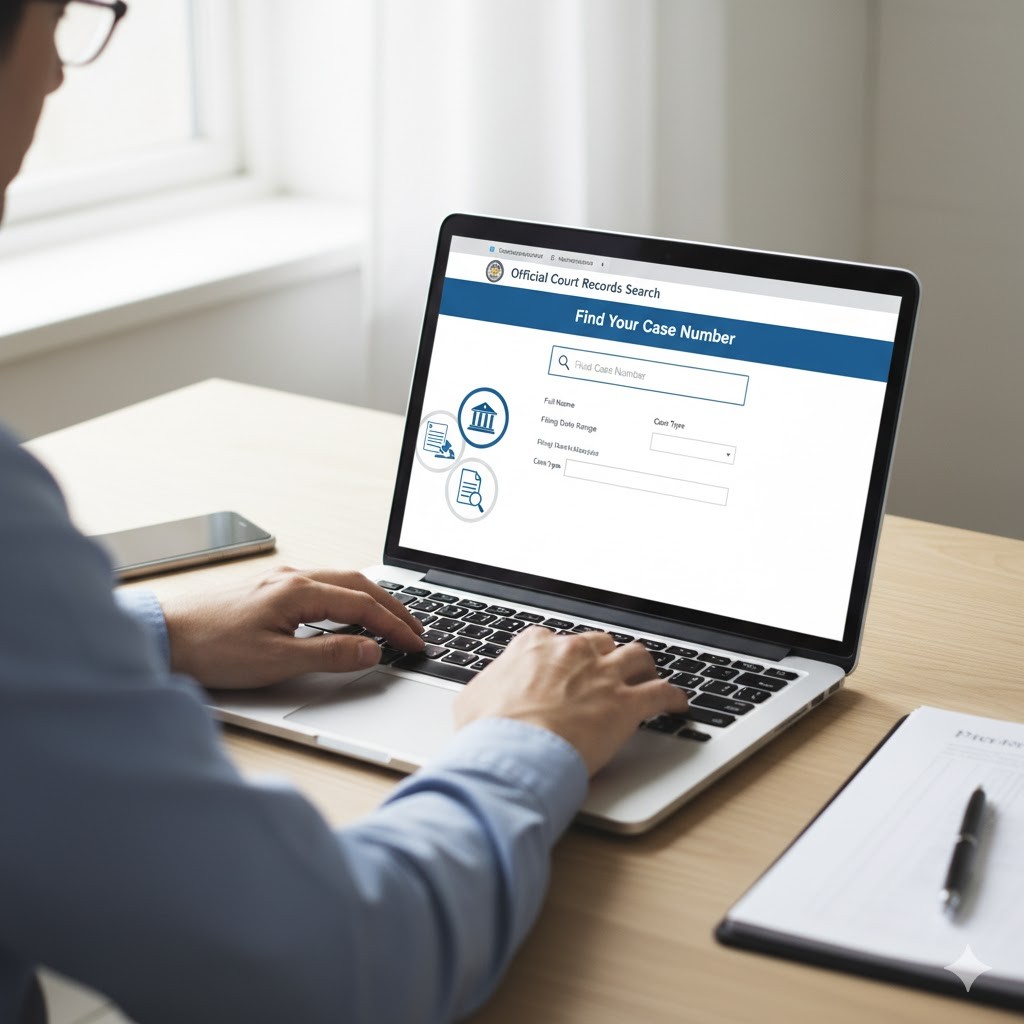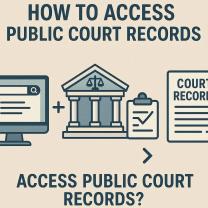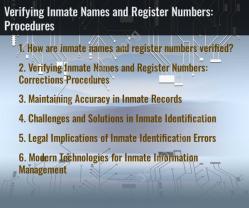How do I look up my case number?
Navigating the legal system can often feel like deciphering a complex code, and at the heart of that system is a crucial piece of information: your case number. A case number is a unique identifier assigned by the court system to track legal cases from their inception to their resolution. Whether it’s a civil suit, a criminal matter, a family dispute, or even a traffic infraction, every case receives its own specific code. This number acts like a social security number for your legal proceedings, distinguishing it from thousands of others.
Knowing your case number is not just a convenience; it's a necessity for efficient engagement with the court system. It makes it significantly easier to access court records, check the current status of your case, and communicate effectively with court staff, attorneys, or other parties involved. Without it, inquiries can become a tedious and time-consuming process, often leading to frustration and delays.
This comprehensive guide is designed to demystify the process of finding or recovering your case number. We will walk you through various methods, both online and offline, outlining what documents and information you should prepare, and where to seek assistance if you encounter difficulties. By the end of this article, you’ll be equipped with the knowledge and tools to quickly locate your case number, ensuring a smoother experience with the judicial system.
How Do I Look Up My Case Number Online?
In our increasingly digital world, most court systems have embraced technology to provide public access to case information. This means that in many jurisdictions, you can look up your case number from the comfort of your home or office. Online case lookup systems or public access portals are invaluable resources for anyone needing to find their case details quickly.
Here’s a general step-by-step outline to guide you through the process:
Visit Your Local Court’s Official Website: The first and most critical step is to identify the correct court jurisdiction. This could be a county court, state court, or federal court, depending on where your case was filed. Always ensure you are on the official government website (look for .gov domains) to protect your privacy and ensure accuracy.
Locate the “Case Search,” “Docket Search,” or “Public Records” Section: Once on the court's website, look for clearly labeled links or menu items such as "Online Services," "Case Search," "Court Records," "Public Access," or "Docket Search." These sections are specifically designed for public inquiries.
Enter Identifying Details: Most online portals will require you to enter specific information to narrow down the search. Commonly requested details include:
Your full name or the full name of a party involved: Use the exact spelling as it appears in court documents.
Filing date or approximate time period: Providing a date range can significantly help, especially if you have a common name.
Case type: Specifying whether it's a civil, criminal, family, or traffic case can refine your search.
Attorney bar number: In some systems, your attorney's bar number can also be used.
Review Results to Find Your Matching Case Number: After submitting your search query, the system will display a list of cases that match your criteria. Carefully review the results, looking for your name, the names of other parties, and the case type to identify your specific case. Once found, the case number will be prominently displayed.
It's worth noting that some courts may require you to create an account to access their online portal, especially for more detailed information. Additionally, a small access fee might be charged for certain advanced searches or document downloads.
Tip: For the best results when performing an online case number search online, always use the exact spelling of names and be as precise as possible with date ranges. Small discrepancies can lead to no results or an overwhelming number of unrelated cases.
What Documents Do I Need To Find My Case Number?
Even with online search capabilities, having certain documents and information readily available can significantly expedite your search for a court case number. These details act as crucial identifiers within the court’s record-keeping system, helping you or court staff pinpoint your case efficiently.
Here's a list of commonly needed information or paperwork:
Full name(s) of parties involved: This includes your full legal name, as well as the names of any other individuals or entities directly involved in the case (e.g., defendant, plaintiff, petitioner, respondent).
Date of filing or approximate time period: Knowing when the case was initiated, even if it's just a month and year, can drastically narrow down search parameters.
Court name and location where the case was filed: Specify the exact court (e.g., "Superior Court of Los Angeles County," "District Court for the Southern District of New York") and its physical location if there are multiple branches.
Type of case: Clearly state whether it's a civil, family, criminal, probate, traffic, or small claims case. This categorization is vital for directing your search to the correct department or record system.
Any reference letters or previous notices from the court: Any official correspondence you've received related to the case will almost certainly include the case number.
Attorney's name and contact information: If you were represented by an attorney, they will have the case number on file.
If you are searching for your case number in person at the courthouse, a valid photo ID (such as a driver's license or passport) may be required for identity verification, especially if you are requesting confidential information or physical documents.
Before heading to the courthouse or attempting an online search, take a moment to check your personal records. Review email receipts, correspondence from your attorney, or any old court documents you might have. These often contain the lost case number or other reference numbers that can be instrumental in your search.
Can I Search for a Case Number in Court Records?
Absolutely. Court clerks are the custodians of all public records and maintain extensive archives where you can find my court case number by name or filing date. While online systems offer convenience, sometimes a direct search within the court records themselves is necessary, especially for older cases or those with limited online access.
Here are the primary options for searching court records:
In-person search: This is often the most direct method, particularly if you're struggling to find information online or need to access physical documents. Visit the courthouse’s records department or the clerk’s office for the specific division that handles your type of case (e.g., criminal, civil, family). Court staff can guide you to public terminals or physical indexes where you can search. Be prepared with as much identifying information as possible, as listed in the previous section.
Mail request: Some courts, especially for older or archived cases, accept written requests for case information. You'll typically need to send a formal letter including all relevant identifying details, a self-addressed stamped envelope, and potentially a small fee for copies or research. Check the specific court's website for their mail-in request procedures and forms.
Third-party legal databases: Beyond individual court websites, there are larger legal databases that compile case information. For U.S. federal cases, PACER (Public Access to Court Electronic Records) is the official system. It allows users to search and retrieve federal appellate, district, and bankruptcy court records. State-level eCourt systems or subscription-based legal research platforms (like LexisNexis or Westlaw, often used by legal professionals) also offer extensive court records lookup capabilities. Access to PACER typically requires registration and involves per-page fees for viewing documents, though simple searches are often free.
It's crucial to remember that not all cases are publicly searchable. Confidential or sealed cases, such as those involving juveniles, adoptions, or certain sensitive family matters, are typically not accessible to the general public. These records are protected to safeguard the privacy of the individuals involved.
Before embarking on any search, always double-check and verify the court jurisdiction. Knowing whether your case was handled by a local municipal court, a state superior court, or a federal district court will prevent wasted time and effort searching in the wrong place.
How Do I Recover a Lost Case Number?
Losing track of your case number can be stressful, but it's a common occurrence, and there are straightforward methods to recover lost case number. The key is to systematically retrace your steps and leverage the resources available through the court system and legal professionals.
Here are practical recovery steps:
Contact the Court Clerk’s Office Directly: This is often the most effective first step. Call or email the clerk’s office of the specific court where your case was filed. Be prepared for potential wait times, as these offices can be very busy.
Provide Identifying Details: When you speak with the clerk, clearly provide as much information as you have, such as your full name (and any alternative spellings used), the names of other parties involved, the type of case (e.g., civil, criminal, family), and the approximate dates or year the case was filed. The more details you can offer, the easier it will be for them to locate your record.
Ask for a Copy of the Docket Sheet or Case Summary: Once your case is located, you can request a copy of the docket sheet or a basic case summary. These documents will clearly list the official case number along with a chronological record of filings and court actions. There might be a small fee for copies.
If Represented, Contact Your Attorney: If you had legal representation for the case, your attorney or their paralegal will undoubtedly have the case reference number on file. Reach out to their office; they can provide it quickly.
For Federal Cases, Use the PACER System or Call the Clerk: If your case was in a federal court, the PACER system is your go-to online resource. If you can't find it there or prefer direct assistance, call the clerk of the relevant federal district court. They can often help you search their records.
It’s important to note that for security and privacy reasons, identity verification may be required before court staff release specific case details, especially if you are not a direct party to the case. Be ready to confirm your identity if asked.
Tip: To prevent future issues with a lost case number, always store it digitally. Send it to yourself in an email, save it in your phone's notes, or keep a dedicated digital document for all your legal reference numbers. This simple habit can save you hours of frustration down the line.
Where Can I Contact for Case Number Assistance?
When you need assistance finding your case number, knowing the right points of contact court clerk or other court resources is crucial. While the process can sometimes be daunting, various channels are available to guide you.
Here are helpful contact options:
Court Clerk’s Office: This is your primary point of contact for all case records. Each court (county, state, federal) has a clerk's office responsible for maintaining case files, dockets, and general court administration. You can usually find their contact information (phone number, email, physical address) on the official court website under sections like "Contact Us," "Departments," or "Clerk's Office."
Judicial Help Desks or Information Counters: Many larger courthouses operate dedicated help desks or information counters, often located near the main entrance or in the public records area. These staff members are specifically there to assist the public with general inquiries, direct them to the correct department, and help with basic case searches.
Online Contact Forms: Some court websites offer online contact forms where you can submit your inquiry electronically. This can be a convenient option if you prefer not to call or visit in person, though response times may vary.
Legal Aid Organizations: If you are unsure which court handled your case, or if you require more extensive assistance due to complex circumstances or limited resources, legal aid organizations can be invaluable. They often provide free or low-cost legal assistance and can help individuals navigate the court system to find necessary information.
When reaching out for help, whether by phone or in person, it's wise to be prepared. Before you call or visit, gather all the case details you have (names, approximate dates, case type). Having this information ready will significantly speed up the process and allow court staff to assist you more effectively. Always check the official court directory to ensure you are contacting legitimate court staff and not an unofficial third-party service.
Conclusion
Finding a case number is often a quick and straightforward process once you understand where and how to look. Whether you leverage the convenience of online portals, visit a court clerk's office in person, or refer to your existing documentation, several reliable avenues are available. The digital age has made how to look up case number more accessible than ever, but traditional methods remain important for specific situations.
Staying organized, meticulously keeping records of your legal proceedings, and accurately verifying court jurisdictions can save you hours of frustration and unnecessary delays. Your case number is the key to unlocking essential information, tracking progress, and communicating effectively with the legal system.
We encourage you to bookmark the official court’s search tool relevant to your jurisdiction for future use. Always prioritize official government websites and court resources, and never rely on unofficial third-party websites that may provide inaccurate information or charge unnecessary fees. With these strategies, you can confidently navigate the process of finding your case number and stay informed about your legal matters.













